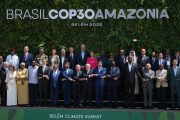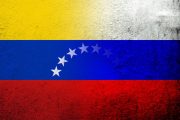When workers at the Kellogg’s cereal plant in Maracay, Venezuela showed up for work on Tuesday, they discovered that the plant was closed. A note taped to the fence simply indicated that the company had ended operations: “The current economic and social deterioration in the country has now prompted the company to discontinue operations.”
That left an estimated 400 workers without work, or a paycheck. But that gave the Marxist dictator Nicolás Maduro an opportunity to point the finger at Kellogg’s: “Why are they doing it today? Because we are four days away from elections and they think it will spook the people.… Imperialists! Oligarchs! Nobody can scare our people!”
Kellogg Company had been making cereal in Venezuela since 1961, and at one point was the largest foreign presence in South America after Mexico. But on Tuesday, after facing hyperinflation, an inability to bring in raw materials from abroad owing to Maduro’s currency restrictions that led to critical shortages in basic raw materials, and diminishing sales as citizens were increasingly unable to purchase even the most basic foods, the company shut down. It follows other companies that saw the disaster coming much earlier and closed their operations: Bridgestone, Kimberly-Clark, General Mills, and Colgate-Palmolive.
The ripple effect will reach much further than just the 400 now-unemployed citizens. Most of them have families with children and were barely able to sustain themselves with a paycheck that continually bought less and less thanks to the ravages of inflation. A few may be able to join the thousands leaving the country every day, but most will be forced to reduce their standard of living even further.
As The New American notedTuesday, the conditions there are “unbearable,” with 35,000 Venezuelans crossing over to neighboring Colombia every day. But even there, conditions aren’t much better as Colombia’s resources, even with private assistance, are stretched beyond the breaking point. Many Venezuelan refugees are being faced with fines they can’t afford and are forced to return home.
Since the Bolivarian “revolution” that began under Marxist dictator Hugo Chávez in 1999, more than four million citizens (about 10 percent of the total population) have left the country, causing the exit to be dubbed the “Bolivarian diaspora” and some comparing the catastrophe to the Ukrainian Holodomor. That horror — also called the Ukrainian Genocide of 1932-33 — was imposed on the Ukrainian people by Soviet dictator Joseph Stalin and resulted in the starvation of between six and 12 million citizens. They died because they had no place to go. For the moment, some Venezuelans have the option of leaving the country. But even that door is closing.
The root cause of the implosion is simple, according to Carlos Larrazabal, president of a local chamber of commerce: “The government maintains a noose around the private sector and, because of that, industries make decisions like the one taken by Kellogg’s. If there’s no change in economic policies, there will be more closures.”
The history lesson that is being taught once again in Venezuela is equally clear. Venezuela was one of the most prosperous countries in Latin America, sitting atop some of the world’s largest known crude oil reserves. But remove the barriers to government intervention and allow a dictator with precious little understanding of the need for, or support of, limited government (Maduro was a taxi driver before taking over after Chávez’s death) to run the place, and the end results were predictable. President George Washington put the matter well: “Government is not reason, it is not eloquence, it is force; like fire, a troublesome servant and a fearful master. Never for a moment should it be left to irresponsible action.”
Another George (Santayana) was equally clear: “Those who cannot remember the past are condemned to repeat it.”
Photo of workers at the Kellogg’s plant in Venezuela after the plant closure: AP Images
An Ivy League graduate and former investment advisor, Bob is a regular contributor to The New American magazine and blogs frequently at LightFromTheRight.com, primarily on economics and politics. He can be reached at [email protected].
Related articles:
Colombia Overwhelmed With Venezuelan Refugees, Deports Some
Creditors Gathering to Plan Seizures Following Venezuela’s Defaults




